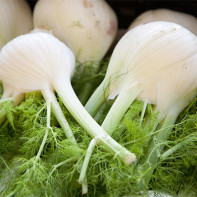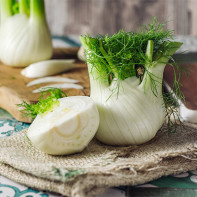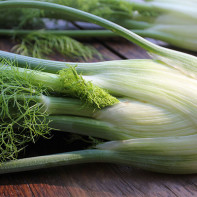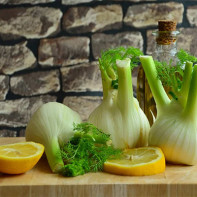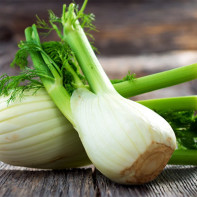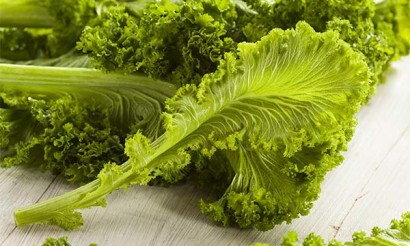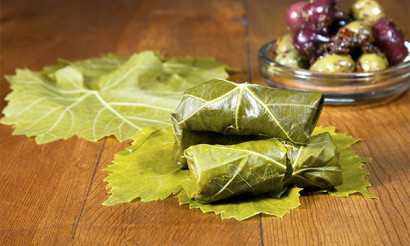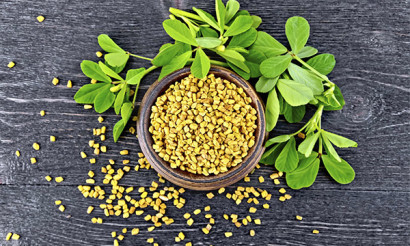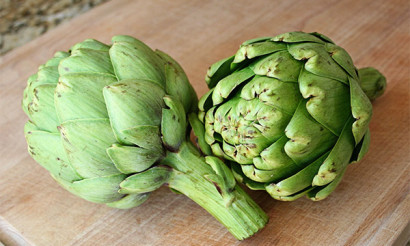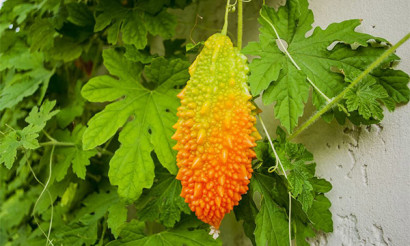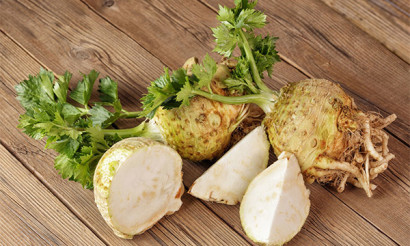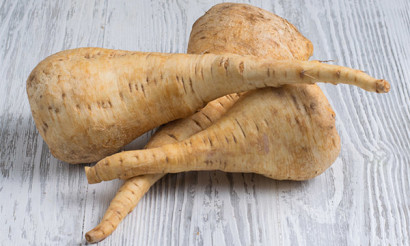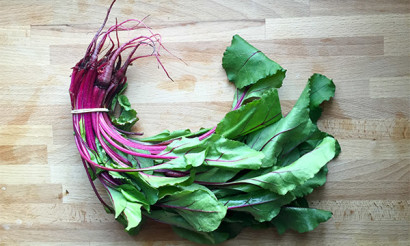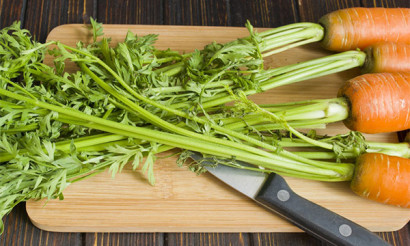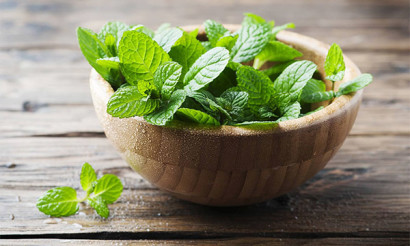Fennel: useful properties and contraindications
A perennial herbaceous plant, similar to dill, but with a bright anise smell, is called fennel. It is widespread in nature, every July the meadows are filled with characteristic yellow umbrellas. The plant has been used since ancient times as a medicinal plant, the first medical writings about it were written by Diocsorides and Avicenna. Later, the culinary potential of fennel was also discovered, it goes in pickles, marinades, is used as a seasoning for fish and meat.
- What is fennel and what does it look like
- Fennel and fennel: what's the difference
- Composition and calories
- Useful properties of fennel
- General benefits
- For Women
- For Men
- In Pregnancy
- Breastfeeding
- For children
- Slimming
- Fennel oil: properties and uses
- What is the usefulness of fennel seeds?
- Tea from fennel: benefits and harms
- Fennel in medicine
- Diabetes mellitus
- When pancreatitis
- For gastritis
- For the bowel
- For constipation
- For gout
- For the Liver
- Recipes of folk medicine based on fennel
- Fennel in cosmetics
- Cooking
- What can be substituted for it
- Fennel Harm and Contraindications
- How to choose and store fennel
- What can be cooked with fennel: Recipes
- Baked fennel with cheese
- Fish stew with tomatoes and fennel
- Interesting Facts about Fennel
What is Fennel and what does it look like?
Fennel is a prominent member of the Celery family (Apiaceae) and is a perennial flowering plant with a spindly rhizome. The stems are erect, round, with a slight bluish patina. The leaf is divided into small filamentous slices, which is why young fennel is often confused with dill. But this plant can grow to 220 cm in a favorable climate. In blooming, fennel also looks like dill as it forms a complicated umbrella of many yellow flowers. Each one produces a fruit - a small elongated seed up to 10 mm long.
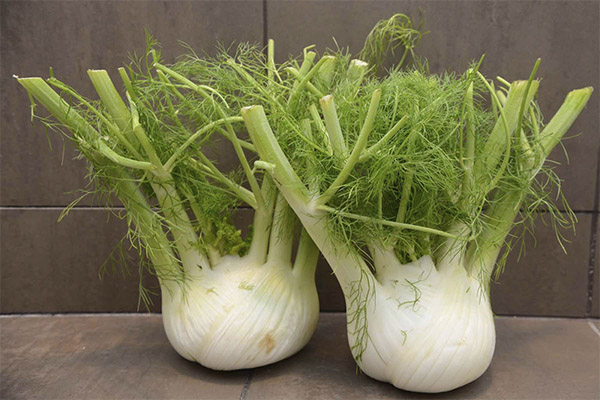
When growing, fennel is very undemanding to the soil and tolerates the close proximity of other crops well. However, the harvest depends directly on the climate, since the plant is very heat-loving.
Fennel and dill: what is the difference
If you put a sprig of fennel and a sprig of dill next to each other, few would be able to guess that they are two different plants. Moreover, the popular name of fennel is apothecary fennel, although this is fundamentally wrong, morphologically they are not even close relatives.
The main domestic difference between dill and fennel is in the smell, it is absolutely different. The tart and spicy smell of a sprig of dill differs from the persistent anise and slightly cloying aroma of fennel. Externally, the plants also differ in the structure of the rhizome, the thickness and height of the stems. Dill blooms a month earlier, from June to July, while fennel blooms closer to August. By the way, dill seeds are small and regular in shape, while fennel seeds are massive and more elongated.
Even greater differences in the effect of the plants on the body. Dill has proven to be a great condiment to any dish, pickle or sauce. In medicine, it is used as a diuretic and auxiliary for gastrointestinal diseases. Fennel is not as popular in cooking, although it has found its place in marinades, pickles and many dishes of Caucasian and Mediterranean cuisine. Its medicinal uses are extremely extensive and go back more than 2,000 years. In general, it has a sedative effect, is an antispasmodic, helps to mildly solve the problem of chronic constipation, has pronounced expectorant properties. The essential oil is actively used as an aid in liver therapy.
Composition and calories
Fennel contains a lot of useful vitamins, essential and fatty acids, as well as essential micro- and macronutrients. Especially a lot of vitamin C, PP and A. There is zinc, phosphorus, manganese and calcium. However, much now depends on the environmental situation at the growing site. Fennel easily picks up quite a few heavy metals from the soil. Therefore, it is highly discouraged to pick wild plants near busy roads or in meadows near factories.
In general, the reference composition of 100 g of fennel is as follows:
- vitamin A - 7 µg;
- vitamin B1 - 0.4 micrograms;
- vitamin B2 - 0.35 micrograms;
- Vitamin B6 - 0.45 micrograms;
- Vitamin C - 21 m g;
- Vitamin PP - 6 mg;
- calcium - 1196 mg;
- magnesium - 385 mg
- sodium - 88 mg
- potassium - 17 mg;
- phosphorus - 485 mg;
- iron - 18 mg;
- zinc - 3.5 mg;
- copper - 10 mg;
- manganese - 6.5 mg.
The caloric value of 100 g of fennel is 345 calories. Nutritional value:
- carbohydrates - 12.5 g;
- fats - 14.8 g;
- proteins - 15 g;
- dietary fiber - 40 g;
- water - 8,2 gr;
- ash - 9 g;
- saturated acids - 0.5 g.
Useful properties of fennel
General Benefits
The healing powers of fennel have been known since ancient times. Medical works of Dioscorides, Pliny, Avicenna mention this plant as extremely useful, appearing in a number of recipes and healing remedies. Despite the development of technology, preparations using fennel, herbal gatherings and essential oils are now often prescribed by official medicine.
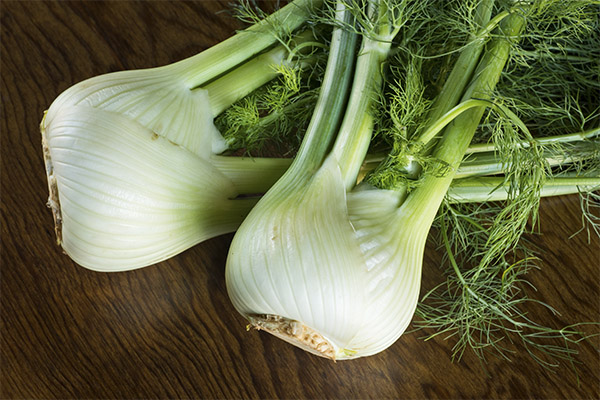
Fennel has the following proven beneficial properties:
- Is an expectorant;
- soothes;
- relieves spasms;
- Is an antioxidant;
- calms inflammation;
- dilates blood vessels;
- Strengthens secretion of milk in women;
- evens out skin tone;
- Has a mild healing effect;
- saturates the subcutaneous layer with vitamins, improving tone.
In medicine, plants grown in ecologically clean areas are used. Roots, stems, leaves, inflorescences and seeds are used in preparations. Various forms, powders, essential oils and decoctions are used.
Mediterranean cooking uses fennel in various forms. For example, baked fish with grated fennel root takes on a particularly exquisite aroma and flavor. Stems, leaves and blossoms are actively used in marinades and pickles. They not only enrich the aromatic bouquet of the product, but also greatly increase the preservation of canned food, as fennel juice has an antiseptic effect.
For Women
Even in ancient Greece, they discovered the special properties of fennel - it perfectly stimulates lactation. The therapeutic collection, proven by two thousand years, consists of the fruits of fennel, anise seeds and oregano herbs in the proportions 1:1:1. It should be poured boiling water and infused for several hours. There is a significant improvement in breastfeeding, with the taste and composition of the milk almost unchanged. Numerous studies have already been conducted by modern medicine, and now fennel is recommended as a remedy in the treatment of lactation disorders. This is confirmed not only by American, but also by domestic scientists. Studies of the Center for Family Planning and Reproduction (CFPR) showed that in the group taking fennel-based teas, the frequency of breastfeeding increased by 3.5 times.
Concentrated oil is used for menopause. It stimulates estrogen production, but it does so gently, without a sudden spike in hormone levels. European studies show an average reduction of as much as 15% in complaints in the group that took fennel oil. The estrogenic effect can be used at any age. It is prescribed to regulate and normalize the menstrual cycle, especially when coming off of harsh hormone therapy.
For men.
Fennel seeds began to be used as an aphrodisiac for men in ancient Egypt. From there, the fame of an aphrodisiac passed to Greece and Rome. Use an alcoholic tincture based on dry wine, fennel seeds, celery leaves, currants, raspberries and flowers of St. John's wort. The daily use of 50 ml of this tincture significantly increases the male potency. In this case, it does it gently and comfortably, unlike modern medications.
The patricians and dignified citizens of ancient Rome appreciated the effectiveness of fennel oil in eliminating toxins and normalizing digestion after another feast. Fennel essential oils in this application have a double effect:
- Have a mild laxative and antispasmodic effect in the gastrointestinal tract.
- Protect the liver in the breakdown of alcohol and heavy foods.
Pregnancy.
Modern medicine recommends against taking fennel tea and any preparations based on it. Previously, it was advised as a mild herbal remedy to combat toxicosis in the first trimester of pregnancy, as well as to normalize bowel function at any term, noting a really mild, fully controlled and comfortable effect. However, the studies that came out prove a significant (over 12%) increase in miscarriages in pregnant women who consumed fennel tea. Perhaps this is due to the effect on similar groups of smooth muscles, with a large and stable dosage, the active substances of fennel can affect the similar muscles of the uterus.
When breastfeeding.
The essential oil and fruit of fennel significantly increases the separation of milk. Modern medicine considers it a completely safe and effective remedy. On its basis, many commercial preparations of similar purpose are made. Separately, the absence of any influence of fennel on the very quality of milk and its composition is noted. This is a really safe and effective remedy - according to Russian studies, regular use of preparations and teas will increase the frequency of breastfeeding by 3.5 times.
In addition to improving lactation, fennel-based teas and preparations have other useful qualities for young mothers. They have a mild sedative effect, increase estrogen, and normalize the gastrointestinal tract.
For children
Mild medication is prescribed even for the youngest children. Today, decoctions and teas are considered a safe remedy for relieving the first colic in a child. However, it is forbidden to give fresh fennel or its seeds before the formation of a stable flora in the child. Typically, heat-treated greens or root can be given from 8 months of age, and herbs from 1.5-2 years of age.
Dill water or special baby tea is used for children under 7 months of age. The usual dosage is 2 g per glass of boiling water. It can be added to baby food and formula. The main thing is not to exceed the single and daily dosage. Since a year, you can use fennel in vegetable soups and casseroles.
The useful qualities of fennel are actively used in pediatrics, used to normalize the gastrointestinal tract, as an aid in poisoning. In case of colds, a gargle is prescribed. Infusion of fruit has a pronounced expectorant effect.
For weight loss.
Fennel shows itself well as a means to promote weight loss. And the effect is achieved in several ways. The seeds will help overcome night appetite. When you want to eat something, you just need to chew a few fennel seeds. Greens used during the diet will help to adjust the digestive processes, to achieve better assimilation of useful substances. A diet using fennel will be rich, delicious and at the same time - low-calorie.
For weight loss, it is recommended to use a variety of vegetable and dietary dishes. And fennel is perfectly combined with other flavorful greens, for example, an excellent, rich and tasty green smoothie is obtained with celery. The diet can really be varied, very tasty, healthy and affordable at the same time. You can focus on Mediterranean cuisine - salads, soups, low-fat fish. All this is generously enriched with seasonings, spices and fennel. Such a diet will not get bored, but will be desirable, delicious, useful and interesting to prepare.
Fennel oil: properties and uses
Fennel oil is obtained by steam distillation of the seeds. It is a versatile product in cosmetology and medicine, it is also used in cooking to a limited extent. Among the main proven properties are the following:
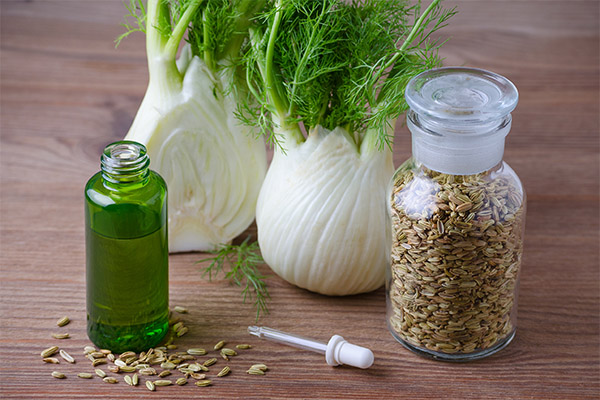
- It is used to clean wards and apartments, it is enough to spray 2 drops per 5 square meters, and the number of fungi in the room is reduced by 5-6 times.
- Stimulates the production of natural estrogen.
- It is a moderate antispasmodic, diuretic, sedative, mild laxative, hepatoprotective.
- Saturate the subcutaneous layer of vitamins and macronutrients.
- Has an antioxidant effect.
- It has an anti-inflammatory effect when used externally.
This baggage of useful properties allows the use of fennel oil externally, internally and for treating the premises. The effect on the skin is most beneficial. Due to the saturation of the subcutaneous layer it is possible to smooth wrinkles, to give freshness and return youthfulness to the skin. Therapy against acne, pimples and dermatitis show good results.
Internally, the oil is prescribed and used for a variety of diseases. Women will be able to normalize the menstrual cycle and soften the onset of menopause. For men, it is a good hepatoprotector, especially against alcohol and heavy foods. It is a universal diuretic and mild laxative. It can be used for cramps, abdominal pain, flatulence and in recovery therapy after poisoning. Moderate sedative properties will help relieve anxiety, get rid of insomnia.
What are the benefits of fennel seeds
Fennel seeds are actively used in cooking and auxiliary therapy. The oil has a higher concentration of essential substances, so it is more effective and convenient for treatment. However, the seeds have pronounced antioxidant properties. Moreover, unlike oil, it is the form of the seeds that can reduce harmful cholesterol by 7-9% according to a large European study.
For those who want to lose excess weight, the seeds help to suppress appetite, especially at night. It is enough to chew just a few kernels for the body to feel full. The seeds can be used for mild flatulence and digestive problems. The acids and substances available will help to gently solve intestinal problems.
Fennel Tea: Benefits and Harms
The most used form of fennel is tea. It can be given even to infants. It has a rather pleasant taste, quickly brewed, it is also used in cosmetology, in the form of lotions. This can remove the effect of inflamed eyes, speed up the healing of wounds or remove traces of a pimple. Fennel tea should be used:
- To relieve intestinal colic in children;
- for flatulence;
- for normalization of digestion;
- for toxicosis;
- as a mild laxative and diuretic;
- as a mild sedative;
- for colds;
- For the normalization of the cycle in women, with slight irregularities;
- In various diets as an aid.
However, like any medicine, fennel tea has certain contraindications and minor side effects. Modern studies have found a 12% increased risk of miscarriage in pregnant women with regular consumption of fennel tea. Epilepsy is also a strict contraindication because the tea can stimulate the onset of a new seizure.
Side effects are extremely rare, mostly due to a single or chronic overdose of the drug. The daily total intake should be counted, including the greens in a salad, the baked root in a vegetable stew, a teaspoonful of oil, and an evening handful of fennel seeds. Allergic reactions, including serious ones, symptoms of toxicity and heart rhythm disturbances can occur with this consumption. In chronic overdose, there is an addictive stimulation of the intestine, after stopping the intake - peristalsis decreases sharply, there are serious congestion and constipation.
Fennel in medicine
From the times of Ancient Egypt and Greece to the present day, fennel has been actively used by official medicine. Even modern technology and medicines have not been able to displace the proven plant for thousands of years.
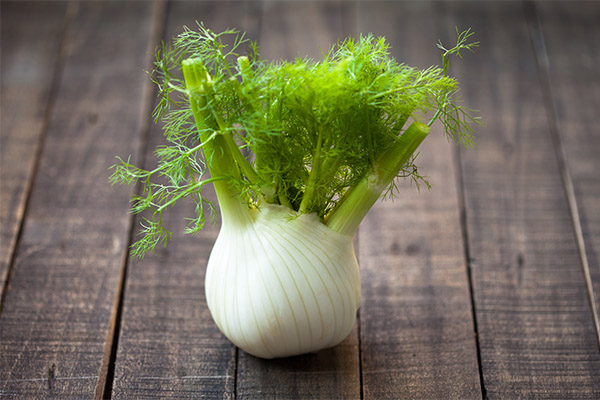
Fennel-based medications are especially recognized for their mild and controlled effects. It's an excellent solution for maintenance therapy and for minor disorders. Today various forms of fennel are prescribed:
- in gastritis of different nature;
- As a supportive therapy for peptic ulcer disease;
- for flatulence;
- For relief of gout;
- For chronic cholelithiasis;
- Gargle for sore throat with angina, bronchitis and acute respiratory infections;
- In the initial stages of hypertension;
- For chronic pain and spasms;
- To relieve swelling in fluid retention;
- In pancreatitis as part of therapy;
- Hepatoprotector in the treatment;
- For normalization of hormonal background in women;
- As a drug to improve lactation;
- In hysterics, states of nervous agitation in the therapy;
- As a mild sleeping pills as part of complex drugs.
In official medicine, two main forms are used - tea and oil. The first has the most mild action, it can be given even to infants, to form on its basis targeted herbal gatherings. Fennel oil is a squeeze of all the active substances of the plant, it is easy to use, choose the dosage, it has the fewest side effects.
In Diabetes Mellitus
Fennel can be actively used in the diet of patients with diabetes, as well as in supportive therapy. The roots, leaves, seeds and oil have an extremely low glycemic index. This allows you to consume them without fear of problems. Fennel is recommended for diabetics of any type.
The useful properties lie in the high content of potassium, which increases the body's sensitivity to insulin. Also, essential oils and vitamin C activate natural mechanisms to reduce blood sugar levels in type 2 diabetic patients.
Important: The glycemic index of fennel is 15 units.
In pancreatitis
Pancreatitis is an extremely unpleasant and dangerous disease that requires adequate diagnosis. In some cases, only surgery is indicated, and it is a matter of survival. However, with a chronic course, it is possible to avoid surgical intervention, being limited to medication therapy only.
The key point is that fennel cannot cure or heal the pancreas, slow down or stop destructive processes in the gland. What is needed is medication therapy as prescribed by the doctor. In this case, the infusion of fennel seeds fits perfectly into the treatment regimen, significantly alleviating the condition. It is necessary to infuse 3 teaspoons of seeds in a glass of boiling water for an hour. Take 100 grams 4 times a day.
With gastritis
Fennel has stimulating and analgesic qualities. It is actively used in gastritis as part of the collection. For example, gastric, monastic and others. This is a balanced, natural, and most importantly - effective therapy.
It is important to establish an accurate diagnosis based on a laboratory study. There are different types of gastritis, and even fennel is used in different ways. The most versatile recipe allows you to alleviate symptoms and wait relatively comfortably for your doctor's appointment. It is necessary to take a spoonful of honey and add 5 drops of fennel essential oil. Take three times a day.
After establishing the type of gastritis is prescribed therapy, which almost always includes fennel. The diagnosis should answer the question of what dosage and dosage form the plant should be prescribed.
For the intestines
Fennel tea and oil is very effective in normalizing bowel function. It can be used for various disorders, flatulence, colic, pain and toxemia. The remedy will soften or completely get rid of negative symptoms. Prophylactic use is also allowed, in this case it is better to use fennel tea or a special intestinal collection. The overall effect will be the normalization of digestion in the later stages and activation of intestinal peristalsis.
Pharmacy teas can be used according to the instructions, usually it is 2-3 times a day. Fennel oil is used in therapy, it should be taken 5-8 drops 3 times a day after meals. You can use it as a sweetener, such as sugar.
For constipation.
Modern medicine has a lot of laxatives, but they are all far from ideal. Usually one wants a really mild laxative that will solve the problem asymptomatically and comfortably. Fennel is just such a remedy. As a remedy, you need to take oil on sugar or honey. However, tea is able to solve the problem of chronic constipation, it normalizes the entire process of digestion and intestinal activity. Pretty quickly the stool becomes regular, soft, and going to the bathroom becomes as comfortable as possible.
With gout
The disease is extremely unpleasant, even today there is no adequate and effective treatment. Fennel root is able to somewhat alleviate the condition of the patient. To do this, you need to make a decoction based on 25 g of root per 1 liter of water. Everything should be boiled for 3 minutes, and then cover and insist for 10 minutes. Drink one glass daily.
For the liver
Fennel essential oil has a pronounced hepatoprotective effect. This is especially relevant against the background of alcohol abuse and heavy food. The oil has a complex mechanism of action, it stimulates the metabolism specifically against alcohol and heavy food, which allows you to get rid of negative symptoms faster and normalize the overall condition. By the way, this was noticed already in ancient Rome and began to actively use fennel oils and seeds before large banquets and bacchanalia.
Also fennel oil is actively used in comprehensive treatment programs to restore liver function, in post-surgical remission. It should be taken as prescribed by the doctor, usually 3-4 times a day before meals.
Recipes of folk medicine based on fennel
Fennel is especially widely used in folk medicine, both on its own and as part of combined remedies. Mostly oil, seeds and herbs are used.
- When bronchitis is recommended to dissolve in 200 ml of boiled milk 7-10 drops of fennel essential oil. You can add a spoonful of sugar or honey for flavor. Take warm three times a day.
- Coughing attacks can be softened by using 5 g of crushed seeds, they should be poured over a glass of boiling water and boil on low heat for about 30 minutes. After insist under a lid for another hour. Take an expectorant 2 tablespoons before meals, three times a day.
- For flatulence, upset stomach and spasms take 5 grams of crushed seeds and pour 200 ml of boiling water. Insist under a lid for 10 minutes, then strain and take 100 ml three times a day before a meal.
- To increase the production of milk use a combined preparation. You need to take 1.5 grams each of fennel seeds, anise and dill and mix everything in a glass of sour cream. Transfer to the oven and bake for half an hour at 120 degrees. Take once a day, before going to bed.
- Another recipe for lactation is based on milk. You need to crush 30 grams of fennel seeds and insist on warm milk, you can add nutmeg or other spices to taste. After straining, take every morning before breakfast.
- Reduces attacks of pancreatitis infusion of 3 teaspoons of crushed fennel seeds per glass of boiling water. Infuse for an hour in a steam bath or simply wrap the container. Take an infusion of 3 tablespoons 4 times a day.
- Fennel herb, carrots and beets can be used to normalize menstrual cycles. You just need to squeeze the juice in proportions of 1:1:1. Thoroughly mixed cocktail to take twice a day 100 ml.
- With gastritis use a combined herbal preparation consisting of fennel seeds, crushed licorice roots, roots of wheatgrass and marshmallow. Take all ingredients by a teaspoon and pour 200 ml of boiling water. After 30 minutes add chamomile leaves, mix and leave for another half hour. After straining, drink 200 ml at night.
- Fennel is great to help in the fight against excess weight. You can add the seeds to a variety of dishes and make a concentrated tea. It is necessary to pour a glass of boiling water over 20 grams of crushed seeds, then put on the fire for 30 minutes. The resulting decoction should be taken daily once a day.
Fennel in cosmetology
The plant has long been firmly established in cosmetology. Many skin creams and lotions contain fennel extracts and oils. Individual preparations are used as cytoprotective, antimicrobial, anti-aging and anti-stress agents. The oil has good antioxidant capabilities and is well established as a venotonic. The extract is used for skin regeneration, toning effect, saturation of the epidermis with necessary useful substances and visual rejuvenation.
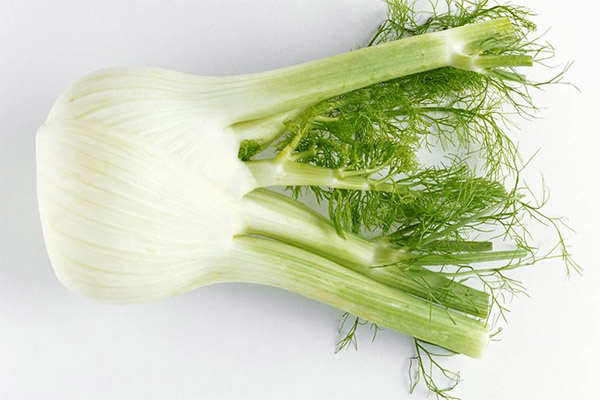
Cosmetologists actively use preparations based on fennel:
- To increase the elasticity of the skin;
- activate the regeneration of the skin;
- improve metabolism;
- Prevention of skin withering and formation of micro wrinkles;
- Improve vascular tone in the subcutaneous layer;
- Treatment of various types of acne and rashes;
- Combating the first signs of cellulite;
- comprehensive care for particularly oily skin.
Folk medicine uses decoction fennel lotions to smooth out wrinkles and remove bruises. Wounds and acne marks are smeared with fennel oil for faster healing.
Culinary Applications
Fennel is used extensively in the Mediterranean kitchen. All parts of this plant are used. The tubers can be baked in vegetable stews, with meat or fish. Many French and Italian recipes for white fish include finely chopped fennel root. Especially popular is stuffed with aromatic stuffing baked carp. The famous Italian fennel sauce is made from tubers and leaves with the addition of cream, fish or meat broth, and vermouth.
Fennel leaves are added to salads, they can be used as a dish decoration with a tantalizing aroma, when serving the table. It is the leaves that are often added to various sauces, marinades and pickles.
Seeds actively go into salads and dishes that need a spicy anise flavor. Often they are added to baked goods or fillings. Grinded into dust seeds are a bright spice, without which it is impossible to imagine a Spanish sausage Chorizo.
What can be substituted
Fennel is still not very popular in our country, although you can easily find it in stores or at the market. The hardest thing to replace greens - usually it is needed fresh and to decorate the dish. Dill is perfectly similar, but it is worth remembering that this is only an external resemblance: the aromas and taste are completely different. Fennel spice is sold in stores, it is ground or whole dried seeds. They will give the right anise flavor and spicy taste. It will not replace them completely, the closest in flavor of the available spices is cumin.
Fennel root can be quite effectively replaced with petioled celery. The flavor will be poorer, but in general it is an adequate substitution, especially if the dish involves the use of finely chopped root and baking or stewing is necessary. Then even those familiar with the flavor and aroma of fennel won't immediately identify a substitute.
Harms and contraindications
Any herb, especially one that has medicinal uses, can cause significant harm if you do not follow the dosage and rules of ingestion. Fennel can pose a threat in the following ways:
- High levels of heavy metals if grown near roads or factories.
- Personal intolerance to complex acids.
- Allergic reaction.
- Disorder of intestinal peristalsis in case of prolonged overdose.
- Increased risk of miscarriage in pregnant women, with systematic use of tea or oil.
Teas and infusions are well tolerated, even by infants. However, it is better to start with small doses and gradually increase them to better control the condition. Oils and extracts can be dangerous only if there is an accumulated overdose of substances. For example, if you drink fennel tea, eat a salad and baked fish with fennel, and then consume a borderline dose of oil or extract, it will lead to an overdose.
Only pregnant women are contraindicated from using fennel-based ingredients. According to studies, there is a 12% increased risk of miscarriage. With caution, fennel should be treated by patients with epilepsy - sometimes the stimulation of a seizure against the background of taking preparations based on it is noted.
How to choose and store fennel
The most difficult thing is to choose and store the rhizome. It is necessary to find really fresh, only from the vegetable garden. The bulb should be firm, slightly pale green, the emergent stems on the contrary - bright, rich green color with an anise odor. Wary of sluggish and soft plants should be avoided.
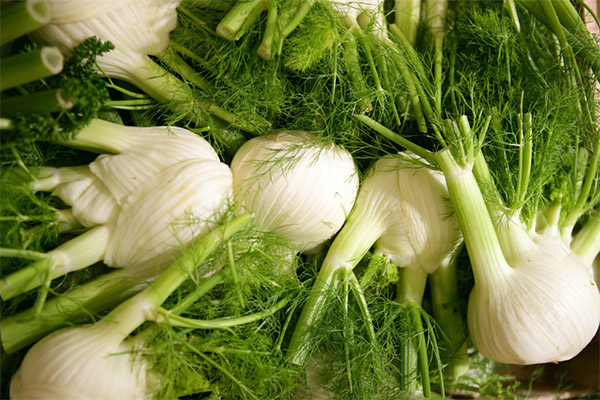
You should also pay attention to the integrity of the root, and it is best to avoid cracks, damage, and detached leaf plates. Fresh fennel root is not stored long at all, in the compartment for vegetables in the refrigerator, it can last no more than 5 days. For medicinal purposes, the root can be cut into small pieces and dried, in this form it will retain its properties for up to six months.
Fresh herbs store even less, but this is traditional for this form of any plant. It is better to choose by the rich color and bright aroma.
The best preserve their properties are seeds, they are collected and dried under a shed, and then kept in a tightly closed container for up to a year. In the industry there is a powdered form of spice, you can find it in stores in the spice department. It is simply ground dried seeds.
What can you make with fennel: Recipes
Fennel is especially used in the Mediterranean cuisine, it is used in salads, added as a side dish, stewed together with vegetables and meat, and used in stuffed fish or poultry.
Baked Fennel with Cheese
The simplest, yet delicious recipe as a standalone dish or in addition to a side dish is baked fennel with cheese.
This is a delicious, healthy and very flavorful dish, for which you will need the following components:
- two fennel bulbs;
- A tablespoon of olive oil;
- 100g of hard cheese, preferably Parmesan;
- A pinch of sea salt or common salt;
- A pinch of pepper, maybe allspice;
- Your favorite herbs and pomegranate seeds for decoration.
Fennel should be peeled, cut off the stems and rhizome. Cut onions into 7-10 mm rings or cut into quarters. This depends on how you want to serve it.
Preheat the oven to 180-200 degrees and prepare a baking tray. Restaurant cooking involves blanching the fennel in water for about 5 minutes. This allows the aromatic bouquet to open up more. However, you can do without it.
Place the chopped fennel root on a baking tray, season with salt and pepper and drizzle with olive oil. Bake for 30 minutes, then check that it is cooked. The fennel should be soft. Sprinkle with cheese and put in the oven for 3-5 minutes more. Before serving sprinkle the dish with greens and pomegranate seeds.
Fish stew with tomatoes and fennel
Fennel is especially good to combine with white fish. In France, Spain and Italy there are a lot of different dishes - stuffed carp, trout, fishnet. However, the most simple and yet revealing rich flavor is a fish stew with tomatoes and fennel.
To prepare it you will need the following products:
- 400 g of fish fillets, it is better to use white saltwater fish;
- Onion fennel;
- 2 cloves of garlic;
- Two tomatoes;
- Three tablespoons of olive oil;
- four thin slices of lemon;
- 100 ml of water;
- ground pepper;
- salt.
For the French variation of this recipe, 60 ml of dry white wine must be added. However, you can do without it.
Peel the fennel, divide it into halves and cut into circles. If only a tantalizing flavor in the fish and gravy is desired, you can cut it into small cubes. Divide the fillets portion by portion. Dice the tomatoes finely, and slice the garlic.
Pour water, olive oil, add lemon, fennel, tomatoes, spices and garlic into a container for stewing. Bring the mixture to a boil, put the lid on and let it stew for 15 minutes. The tomatoes, fennel, garlic and sourness from the lemon will disperse into the sauce.
Pepper and salt the fish a little more, drizzle a little oil and put it in the sauce. If the dish is cooked with wine, pour it at this stage along with the fish. Braise further until cooked, it depends on the type of fish and thickness of the fillet. Thin sea bass will be ready in 12-14 minutes. Serve the dish with fragrant and gorgeous-looking sauce. You can add your favorite herbs 2-4 minutes before removing from the heat.
Interesting Facts about Fennel
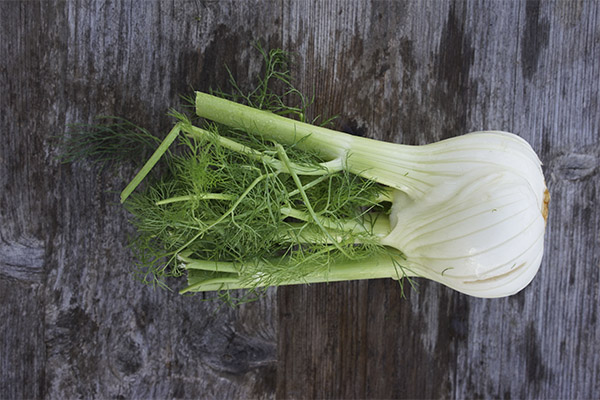
- Fennel has been known to people since very ancient times. However, even now there is some controversy about its origin. The first information about the plant came from Greece, then it quickly spread to Egypt and west to Europe. The Persians, however, may have been the first to use fennel in cooking. Another theory points to more ancient times in Assyria.
- The plant got its now-familiar name of fennel from the Romans. It means "hay" in Latin. The Greeks originally called it "marathon," which is how it entered the first treatises of thinkers and physicians.
- In India, fennel acted as a modern breath freshener. The seeds were simply chewed before important negotiations or meetings. The pleasant aroma filled the mouth and refreshed the breath. This tradition was then firmly rooted in medieval Europe.
- Fennel seeds are included in both of the most popular oriental spice sets. China's Five Spices and India's Panch Phoron have ground seeds in their composition. They add a tangy and slightly anise flavor to the overall spice collection.
- Fennel has had extensive mystical meanings in many cultures. The Anglo-Saxons considered it a sacred plant, listing it as one of the 9 most important and requiring worship. In the Middle Ages, it was believed that a decoction of fennel and St. John's wort would ward off witches and all manner of evil spirits. This has some basis in fact: the fumes from the decoction really do drive away almost all insects.
- On the island of Madeira there is a town called Funchal, named after fennel. In Portuguese the plant is called "funshu. The first colonists discovered a mass of wild fennel in the area and gave the new town a corresponding name.
«Important: All information on this site is provided for informational purposes only for informational purposes only. Before applying any recommendations, consult with a specialist. health care professional before using any of the recommendations. Neither the editors nor the authors shall be liable for any possible harm caused by materials."

